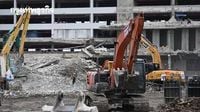On May 7, 2025, significant developments emerged regarding the ongoing investigations into corruption related to the construction of a new parliament building in Thailand. The Special Case Investigation Department (DSI) has authorized a thorough investigation into financial irregularities associated with the project, which includes allegations of money laundering and misconduct by several individuals involved in the selection of senators.
According to Senator Somchai Wutthisopha, the DSI's initiative is part of a broader effort to address corruption within the government, particularly concerning the recent construction projects. The investigations are reportedly focused on the actions of key figures, including engineers and other officials who played pivotal roles in the construction process.
The DSI's investigation has already made substantial progress, with approximately 80% of the inquiry completed. Investigators have gathered testimonies from over 100 witnesses, including officials from the Office of the Auditor General (OAG), family members of victims, and representatives from construction companies involved in the project. This extensive collection of evidence is crucial for building a case against those implicated in the alleged wrongdoing.
Among the individuals facing potential charges are more than five engineers linked to the construction of the parliament building. They are being investigated under Articles 227 and 238 of the Thai Penal Code, which pertain to negligence in construction practices that could endanger lives. The authorities are expected to file charges against these engineers shortly.
In a parallel investigation, the DSI has also been examining allegations of money laundering connected to the process of selecting senators. This inquiry has been ongoing for nearly two months and involves scrutinizing financial transactions exceeding 500 million baht related to the election of senators at various levels.
As part of this investigation, the DSI has been collaborating with the Election Commission of Thailand (ECT) to analyze evidence and witness testimonies. The committee tasked with this investigation includes representatives from both the DSI and the ECT, ensuring that a comprehensive approach is taken to address the allegations of electoral fraud.
On May 8, 2025, the ECT is set to summon the first batch of 60 senators to respond to allegations of misconduct under the Election Act of 2018. These senators are reportedly facing serious accusations related to their selection process, with indications that many were not elected through legitimate means.
Sources indicate that discussions among the implicated senators suggest a coordinated effort to manage the fallout from these allegations. Rumors have circulated that some senators believe they have already reached agreements to mitigate the consequences of the impending charges. This situation raises concerns about the integrity of the electoral process and the accountability of public officials.
In a related matter, the DSI has been conducting a thorough review of the construction practices employed in the parliament building project. This includes analyzing the materials used and the adherence to safety standards. The investigation has led to the collection of physical evidence, including samples of concrete and steel, which are being examined by forensic experts.
The authorities are committed to ensuring that those responsible for any negligence or misconduct are held accountable. As the investigations unfold, the DSI aims to present their findings to the public and the relevant legal authorities, ensuring transparency in the process.
The implications of these investigations extend beyond individual accountability; they also raise critical questions about the broader systemic issues within the Thai government and its handling of public resources. The DSI's actions reflect a growing recognition of the need to address corruption at all levels of government.
As the situation develops, stakeholders from various sectors, including civil society organizations and political analysts, are closely monitoring the outcomes of these investigations. There is a shared hope that these efforts will lead to meaningful reforms and greater integrity in public service.
In summary, the investigations into the construction of the new parliament building and the selection of senators represent a crucial moment for accountability in Thailand. With multiple inquiries underway, the public is eagerly awaiting the results, which could lead to significant changes in how government projects are managed and how public officials are held accountable for their actions.





